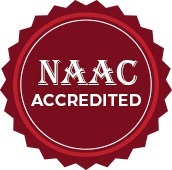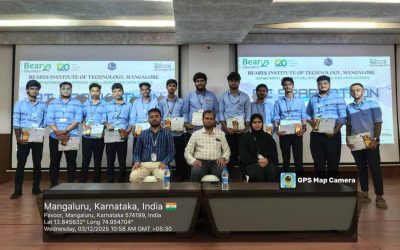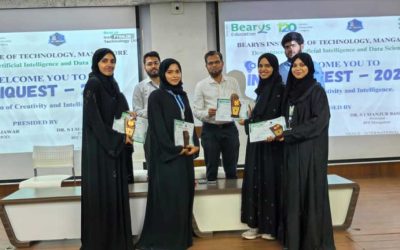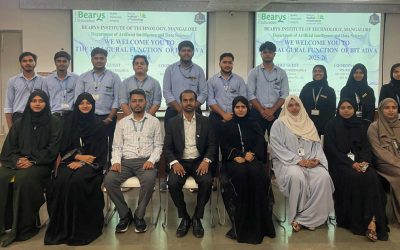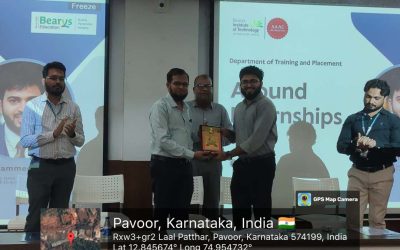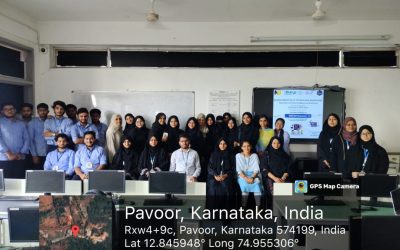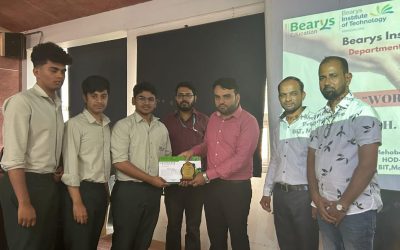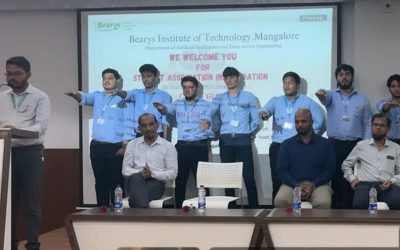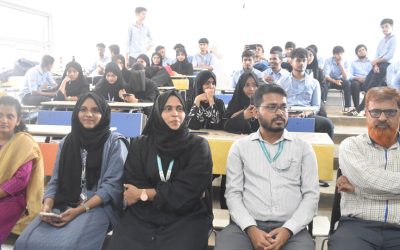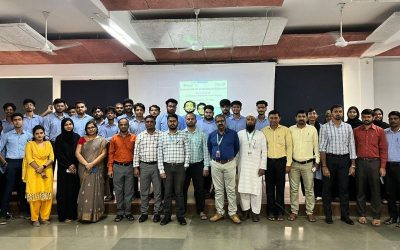artificial intelligence &
data science
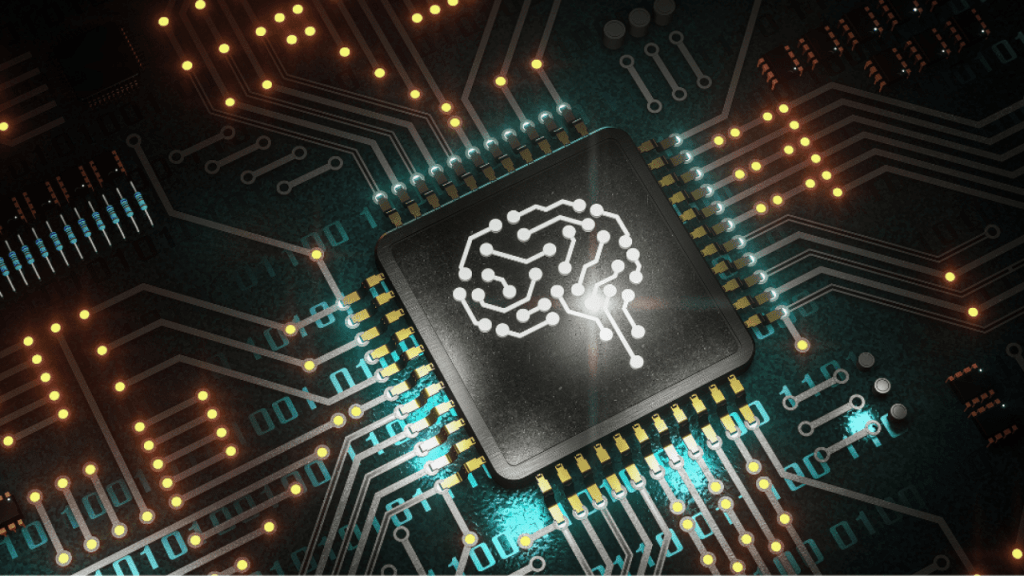
Understanding how to analyze, validate and interpret it to inform decision making are important skills in almost any area of life. Nationally, there is a widely acknowledged shortage of skilled artificial intelligence (AI) and data scientists to meet industry needs. This programs will equip you with the skills and expertise you need to launch a career in this fast- growing industry. The program is aimed at STEM (Science, Technology, Engineering and Mathematics) students who want to improve their digital skills. It is also suitable for people who want to improve themselves and improve their career prospects. You will cover topics such as programming, statistics, machine learning, big data, data visualization, computer vision, and ethical and legal responsibility for the use of data. Teaching takes place on campus through a series of tailor-made modules. In the higher semester, you will do academic work or an internship in industry where you will apply your knowledge to real – world problems using data science and AI solutions. The institute works with a number of employers to offer students internship opportunities. By the end of the programs, graduates will have developed key skills in AI and data science, including programming, data visualization, problem solving and data interpretation. You can apply artificial intelligence and data science techniques to real-world problems; critical evaluation of AI and data science methods; plan, design and conduct empirical research and interpret, present and communicate the results of data science and AI solutions. The programs brings together expertise from departments across the Faculty of Science and Engineering, including computer science, physics and mathematics.
VISION
MISSION
- To collaborate closely with industry partners and leading academic institutions to enhance our knowledge base and create innovative solutions through research and academia.
- To establish an environment of educational distinction through excellent teaching and learning approaches.
- To prepare students for successful careers and ethical leadership in the field.
- To develop individuals with the strong ability to address real-world challenges effectively.
VISION
- To collaborate closely with industry partners and leading academic institutions to enhance our knowledge base and create innovative solutions through research and academia.
- To establish an environment of educational distinction through excellent teaching and learning approaches.
- To prepare students for successful careers and ethical leadership in the field.
- To develop individuals with the strong ability to address real-world challenges effectively.
PROGRAM OUTCOMES (POs)

1. Engineering Knowledge

2. Problem analysis

3. Design/ Development of Solutions

4. Conduct investigations of complex problems

5. Modern Tool Usage

6. The Engineer and Society

7. Environment and Sustainability:

8. Ethics
Apply ethical principles and commit to professional ethics and responsibilities and norms of the engineering practice.

9. Individual and Team Work

10. Communication
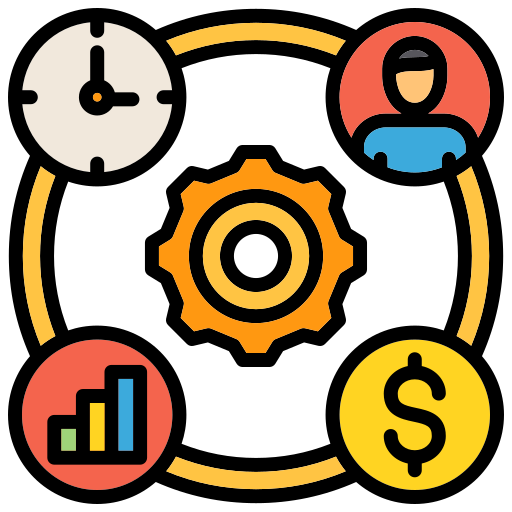
11. Project Management and Finance
Demonstrate knowledge and understanding of the engineering and management principles and apply these to one’s own work, as a member and leader in a team, to manage projects and in multidisciplinary environments.

12. Life-long learning
Program Specific Outcomes (PSOs):
1. To design and implement AI algorithms for complex real-world problems, convert these problems into AI and data science formats, leverage big data frameworks, and assess solutions to make data-driven improvements.
2. To effectively work in multidisciplinary areas, integrating knowledge to develop robust and efficient AI applications applicable across diverse domains.
COURSE OUTCOMES (COs)
Bachelor of Engineering
2022 Scheme
DATA SCIENCE
Our Faculty

Dr. Mehaboob Mujawar
Teaching Experience: 5 years

Mrs. Akshatha.T
Teaching Exp. : 2.5 years
Industry Exp. : 2.5 years
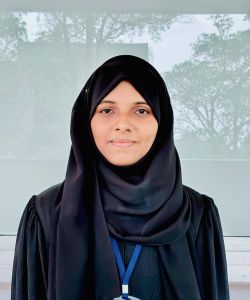
Ms. Soudha N
Experience: 5 month

Mariyath Shabnam

Huzaina

Ms. Aysha Asna
EVENTS
AI Sparkathon 2025 – Two-Day Hackathon on AI and Data Science at BIT Mangalore.
The Department of Artificial Intelligence and Data Science, in association with BIT-ADVA, organized AI Sparkathon 2025, a two-day hackathon focused on Artificial Intelligence and Data Science, held on 1st and 2nd December 2025.
IntelliQuest 2025: One-Day Technical Symposium by the Department of AI & DS
The Department of Artificial Intelligence and Data Science, in association with BIT-ADVA, organized a one-day technical symposium “IntelliQuest 2025” for the students of the department. The programme was conducted with enthusiasm and showcased the innovative abilities of the participants.
BIT-ADVA Students’ Association Inauguration 2025
The Department of Artificial Intelligence and Data Science successfully organized the inauguration ceremony of its Students’ Association BIT-ADVA on 3rd November 2025. The event was graced by the esteemed Chief Guest, Mr. Harish Neermarga, Managing Director, Accolade Tech Solutions Pvt. Ltd.
BIT Signs MoU with JumpWhere Solutions to Bridge Academia-Industry Gap
The Departments of Computer Science and Engineering (CSE), Artificial Intelligence & Data Science (AI & DS), and Electronics & Communication Engineering (ECE) of Bearys Institute of Technology signed a Memorandum of Understanding (MoU) with JumpWhere Solutions LLP, an ed-tech and finishing school committed to bridging the gap between academia and industry.
Two-Day Workshop on Web Development Organized by the Department of AI & DS
The Department of Artificial Intelligence and Data Science successfully organized a Two-day workshop on Web Development on 28th and 29th April 2025.
Bearys Institute of Technology Hosts Interactive Session on NBA Accreditation and Outcome-Based Education
Bearys Institute of Technology (BIT) organized an insightful session titled “Driving Institutional Growth: Insights into NBA Accreditation and Outcome-Based Education” on January 17, 2025. The event, held in the college seminar hall, commenced at 9:30 AM and witnessed enthusiastic participation from faculty and staff.
Industry-Ready Engineers: Skills the Tech World is Hiring For
Bearys Institute of Technology, under the banner of BIT IEEE Student Branch, organized an engaging and informative session titled “Industry-Ready Engineers: Skills the Tech World is Hiring For” at the International Seminar Hall.
Coastal Flavors: A Culinary Celebration of Culture and Community by students of Artificial intelligence and Data Science, BIT, Mangalore
The 3rd semester students of the Department of Artificial Intelligence and Data Science organized a food fest as part of the Social Connect and Responsibility (Activity-5). The event, coordinated by Dr. Mehaboob Mujawar, witnessed enthusiastic participation from around 12 teams, showcasing an array of delectable dishes prepared by the students.
Beach Cleaning by NSS Unit of BIT – 2024
On Sunday, December 15, 2024, the NSS unit of Bearys Institute of Technology (BIT), organised a Beach cleaning drive at Ullal Beach with the theme “Clean Beach and Green Beach.”
World Human Rights Day 2024 Celebrated at BIT, Mangalore
The Department of Artificial Intelligence and Data Science, in collaboration with BIT-NSS and BIT-ADVA, celebrated World Human Rights Day on December 13th and 14th, 2024, with great enthusiasm. The celebration began on December 13th with a series of engaging competitions, including a Skit Competition, Elocution Competition, Poster-Making Competition, Reels-Making Competition, and Just-A-Minute (JAM) Competition. These events provided a platform for students to showcase their creativity and talent, with faculty members from various departments serving as judges.
Food Fiesta Was Organized By The Civil Engineering Department On 28/11/2024
The Department of Civil Engineering hosted a “Food Fiesta” on November 28, 2024, as part of its Social Connect and Responsibility initiative.
Community Clean-Up Drive Organized by BIT NSS Unit at Boliyar Village
The NSS Unit of BIT, in association with the Boliyar Village Panchayat and under the banner of Brahat Swachata Abhiyan , successfully conducted a Community Clean-Up Drive on 26th November 2024 at Boliyar Village.
One Day Session on “NBA and OBE”
IQAC-BIT organized a one-day session on “NBA and OBE” on 13-11-2024. The resource person for the event was Mrs. Roopashree, Assistant Professor and NBA Coordinator, Department of Electronics and Communication, Sahyadri College of Engineering and Management.
Inauguration of Artificial Intelligence and Data Science Students Association
The Department of Artificial Intelligence and Data Science at Bearys Institute of Technology, Mangalore, proudly inaugurated its departmental student association, BIT – Artificial Intelligence and Data Science Visionaries Association (BIT-ADVA), on 9th October 2024.
AI & DS Students Explore Robotics and Advanced Technologies at Comedkares
The Department of Artificial Intelligence and Data Science at Bearys Institute of Technology, Mangalore, organized an industrial visit to the Comedkares Innovation Hub, Mangalore, on 25th September 2024.
Teacher’s Day Celebration in the Department of Artificial Intelligence and Data Science
On the 5th of September, 2024, the 3rd semester students of the Department of Artificial Intelligence and Data Science organized a memorable Teachers’ Day celebration.
Wasil Kasim Secures Silver in State Level VTU Powerlifting Competition
State Level VTU inter-collegiate Power Lifting competition 2023-24. Wasil Kasim 2nd Year AI&DS...
Technical Talk on Patent and Filing Process (Date : 20/06/2024)
The Department of Artificial Intelligence and Data Science, in collaboration with the Internal...
ACHIEVEMENTS
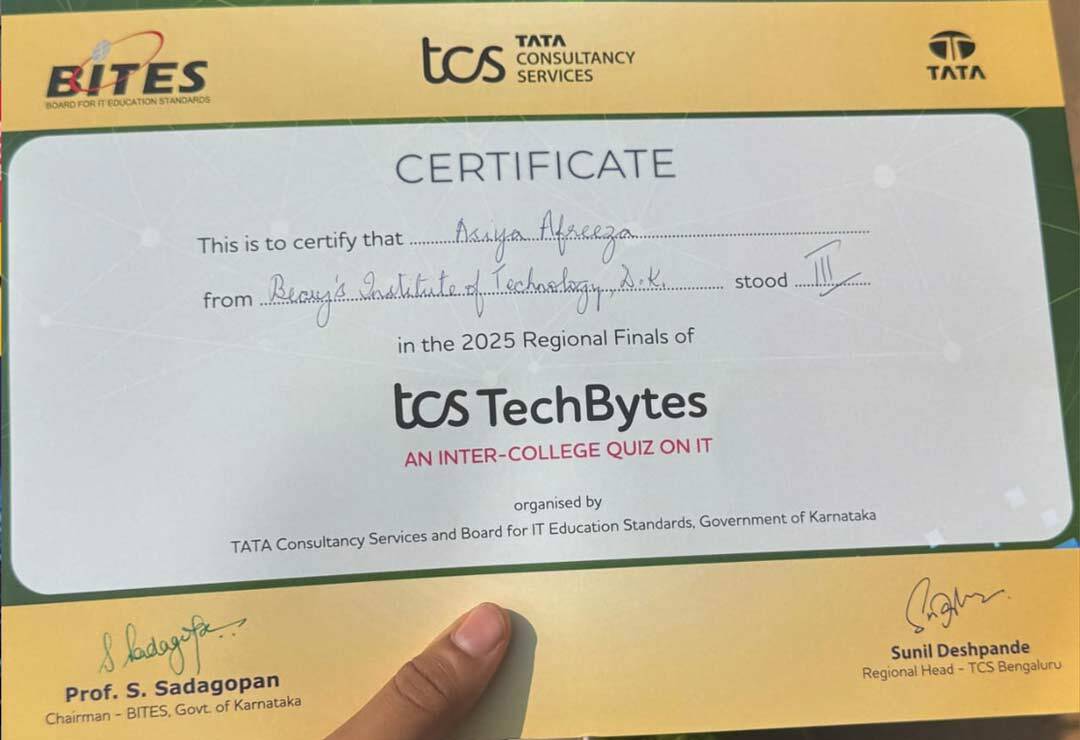
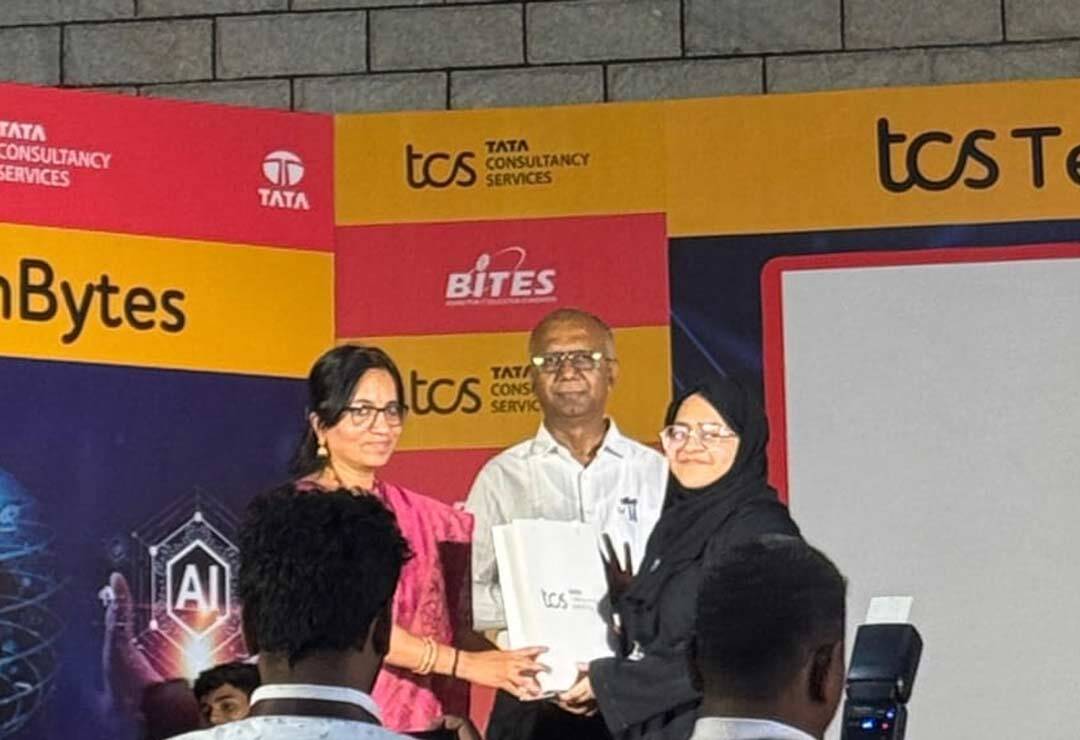
Competing against 350 participants from 15+ institutions across Karnataka, she showcased exceptional knowledge and skill. She was mentored by Dr. Mehaboob Mujawar, HOD, AI & DS, BIT-Mangalore.
Dr. Mehaboob Mujawar
Research Papers:
1. Mehaboob Mujawar, D.Vijaya Saradhi, Muhammad Ajmal Naz, Arjuna Muduli, “Design and Performance Comparison of Arrays of Circular, Square and Hexagonal Meta-material Structures for Wearable Applications” Journal of Magnetism and Magnetic Materials, ISSN 0304-8853, Volume: 553, Publisher: Elsevier, IF:2.993, Journal Ranking : Q2, Published on 1 July 2022. [https://doi.org/10.1016/j.jmmm.2022.169235]
2. Mehaboob Mujawar, T. Gunasekaran, D.Vijaya Saradhi, M.Venkateswararao “THz Microstrip Antenna Array Design for Cancer Detection Through THz Spectroscopy” AIP Proceedings of International Conference on Signal Processing And Communication Engineering Systems (SPACES-2021), organized by Signal Processing Research Group, Department of Electronics and Communication Engineering, K L Deemed to be University, Hyderabad, Telangana, 11th and 12th June 2021
3. Mehaboob Mujawar, D.Vijaya Saradhi, S.Lenin Desai, M.Venkateswararao “Performance Analysis of Dipole and Bow-Tie Antenna for Underwater Communication Using FEKO” 2021 IEEE Sponsored International Conference on Emerging Trends in Industry 4.0 (ETI 4.0), held at OP Jindal University, Raigarh, Chhattisgarh, India ,19th and 21st May 2021[Scopus Indexed]
4. Mehaboob Mujawar, T. Gunasekaran , Aiyas Rashid “Design and Analysis of X Band Pyramidal Horn Antenna using FEKO” 2021 First IEEE International Conference on Advances in Electrical , Computing , Communications and Sustainable Technologies (ICAECT), Shri Shankaracharya Group of Institutions, SSTC –Bhilai, Chhattisgarh, India ,19th and 20th February 2021
5. Mehaboob Mujawar “Design and Analysis of Log-Periodic Dipole antenna as a proximity fuse antenna” 2020 IEEE – International Conference on Industry 4.0 Technology (I4Tech), Vishwakarma Institute of technology –Pune, Maharashtra, India, 13th to 15th February 2020 [Scopus Indexed]
6. Mehaboob Mujawar , Sangam Borkar “Design and Implementation of Wireless security system for railway tracks” 2017 IEEE international conference , Saveetha Engineering College- Chennai, Tamil Nadu ,India 21st and 22nd September 2017
7. Mehaboob Mujawar, Vijaya Saradhi Dommeti “Design of Low Cost Active Noise Cancelling (ANC) Circuit using Ki-CAD” Springer proceedings of 9th International Conference on Innovations in Electronics and Communication Engineering (ICIECE-2021), Guru Nanak Institutions, Hyderabad, 13 – 14 August 2021
8. Mehaboob Mujawar, Aiyas Rashid, Jannisar Akhter Shah “Capacitive Touch Sensor to Control Home Appliances Using PIC16 Microcontroller” Springer proceedings of 3rd International Conference on Communication, Devices and Computing (ICCDC 2021), held on 16-18 August 2021, organized by the Dept. of Electronics and Communication Engineering, Haldia Institute of Technology, Haldia, WB, India.
9. Mehaboob Mujawar, T. Gunasekaran, Jonathan.M.Cansino “STEREO AUDIO AMPLIFIER BOARD USING TDA2822” 3rd Springer International Conference on Computational Science And Applications (ICCSA-2021), held on 10th -11th December 2021, organized by MIT world peace university – pune, India.
10. Mehaboob Mujawar, D.Vijaya Saradhi, K.Swetha “Stun Gun PCB Circuit with Arduino Power Shield”, Springer ICCDN-2021, held on 15th -16th December 2021, organized by Sikkim Manipal Institute of Technology, Sikkim, India.
11. Mehaboob Mujawar, Sangam Borkar “Advanced Niyantran” , International Conference on Research Development in Engineering Technologies ,Sciences and Business Management , Anveshana Educational and Research Foundation- Hyderabad , 8th April 2017.
12. Mehaboob Mujawar “COIL ANTENNA DESIGN FOR INDUSTRIAL AND SCIENTIFIC APPLICATIONS ” International Web Conference on Engineering , Science and Technology 2020 , Kumaraguru College of Technology , Coimbatore – Tamil Nadu , 30th June 2020
13. Mehaboob Mujawar “Headphone/Audio amplifier circuit on PCB using LM386” International E-Conference on “Bio-Electronics & Informatics in the Present Scenario: ECBI-2020”,at Shobhit Institute of Engineering & Technology (Deemed to – be University), Meerut – Uttar Pradesh , June 26-27, 2020.
14. [Best Paper Award] Mehaboob Mujawar “Modelling and design of 13.56 MHz Customized coil antenna for NFC using FEKO ” AICTE and CSIR Sponsored 11th National Conference on Emerging trends in instrumentation systems for smart cities , Sri Ramakrishna Engineering College- Coimbatore, Tamil Nadu , 12 and 13th December 2019
15. Mehaboob Mujawar, Sangam Borkar “Railway Track Fault Detection and Control” National Conference on “Recent Advancements in Electronics and Communication Engineering” SDM College of Engineering and Technology – Dharwad , Karnataka , 8th October 2016
16. Mehaboob Mujawar , Aiyas Rashid “Design of Ultra Wide Band Antenna” National Conference on Recent Technologjes in Engineering and Basic Sciences – 2020 (NCRTEBS-2020) Bonam Venkata Chalamayya Engineering College ( Autonomous). Odalarevu , Andhra Pradesh , 16th July 2020.
17. Mehaboob Mujawar , “TIME IN TIME OUT” 9th annual National symposium on “ VLSI and Embedded system” Organized by Goa university at Carmel college nuvem , 11th April – 2015
18. Mehaboob Mujawar “TITO” Sparx 2015- Paper Presentation Event Goa college of Engineering ponda 24th and 25th march 2015.
19. Mehaboob Mujawar , Piyal Saha , “ Energy Efficient Smart Lighting system ” Zeichen Journal – UGC CARE – Group II Journal , Volume 6 , Issue 6, ISSN 0932-4747 Page: 30-35 , June 2020
20. Mehaboob Mujawar , “Design and Implementation of 12V, 1A Switched Mode Power Supply On PCB using Ki_CAD ” , Journal of Engineering Sciences [ JES ] UGC CARE Journal , Volume 11 , Issue 5, ISSN 0377-9254 , Page:119-123 , May 2020.
21. Mehaboob Mujawar , “Design of Bike Intercom Voice-Over Electronic Circuit System Using Ki-Cad ”, JOURNAL OF SCIENCE, COMPUTING AND ENGINEERING RESEARCH (Open Access Quality Publication of Double-Blind Peer Reviewed International Journal) (ISSN: 2708-1079) Volume 1, Issue 2
22. Mehaboob Mujawar , “Design of Compact and Cost-effective Automatic Sanitizer Dispenser Machine ” Cape Comorin: An International Multidisciplinary Double-Blind Peer-reviewed Research Journal , Volume 2 , Issue 4 , ISSN 2582 – 1962 Page: 13- 17 , May – 2020
23. Mehaboob Mujawar , “ Advanced Security system for railway tracks” International Journal of scientific and Engineering research , Volume 8, Issue 7, ISSN 2229-5518 , July – 2017
24. Mehaboob Mujawar , “Design of reliable electronic door lock system on PCB using Ki-CAD ” International Journal of Microelectronics and Digital Integrated Circuits , STM Journals /Journals Pub , Volume 6, Issue 1, ISSN 2456-3986, Page: 34 – 38 , 2020
25. Mehaboob Mujawar , “Implementation of Frugal Solution for Water Level Detector in Reservoir , Industrial and Agricultural Applications ” International Journal of power electronics controllers and converters , STM Journals /Journals Pub, Volume 6, Issue 1, ISSN 2456-1614, Page: 29 – 34 , 2020
26. Mehaboob Mujawar , “4-Channel Relay Driver Circuit and PCB Design” International Journal of Microelectronics and Digital Integrated Circuits ,STM Journals /Journals Pub ,Volume 6, Issue 1, ISSN 2456-3986, Page: 1 – 7 , 2020
27. Mehaboob Mujawar , “Design and development of Economical mobile signal jammer” International Journal of Electrical power system and technology , STM Journals /Journals Pub, Volume 6, Issue 1, ISSN 2455-7293, Page: 10 – 17 , 2020.
28. Mehaboob Mujawar , “ Planar UWB Antenna for 5 GHz ISM Band ” Journal of Microwave Engineering and Technologies , STM Journals , Volume 7, Issue 2, ISSN 2349-9001, Page: 1-6 , June – 2020.
Book chapters:
1. Mehaboob Mujawar, Subuh Pramono “Textile Based Wearable Antenna for Wireless Applications”, Chapter No:15 , Name of the Book : Printed Antenna, Design and Challenges, CRC Press, Taylor and Francis Group, Page no: 235-247, ISBN: 9781003347057, Year: 2022. [DOI:10.1201/9781003347057-15]
2. Mehaboob Mujawar, “Arrow Shaped Dual-Band Wearable Antenna for ISM Application”, Chapter No:08, Name of the Book : Wearable and Neuronic Antennas for Medical and Wireless Applications , Wiley-Scrivener Publications , Page no: 163-175, ISBN:978-1-119-79180-5, D.O.P: 06 May 2022. [ https://doi.org/10.1002/9781119792581.ch8]
3. Mehaboob Mujawar and T.Gunasekaran, “Effect of Encapsulating Materials on Monopole Antenna Performance for Underwater Communication”, Chapter No: 04, Name of the Book : Smart Antenna : Latest trends in design and application, Springer and EAI, Page no:35-42, Print ISBN: 978-3-030-76635-1, Online ISBN: 978-3-030-76636-8, Published on 01 January 2022.
4. Mehaboob Mujawar and T.Gunasekaran, “Multi-band Slot Microstrip Antenna for Wireless Applications”, Chapter No: 03, Name of the Book : Smart Antenna : Latest trends in design and application, Springer and EAI ,Page no: 23-34, Print ISBN: 978-3-030-76635-1, Online ISBN: 978-3-030-76636-8, Published on 01 January 2022
5. Mehaboob Mujawar , “Antenna Array Design for Massive MIMO system in 5G applications”, Chapter No:18, Name of the Book :Future Trends in 5G and 6G : Challenges, Architecture , and Applications , CRC Press, Taylor and Francis Group , Page no: 321-326 , ISBN: 978-1-003-175-15, eISBN: 9781003175155, Year:2021
6. Mehaboob Mujawar, “Multi-Band Fractal Antenna For Wearable Applications”, Chapter No:01, Name of the Book : Planar Antenna: Design, Fabrication, Testing and Application, Nova Science Publisher, USA, Page no: 1-16, ISBN:978-1-536-19898-0, Year: 2021
7. Mehaboob Mujawar, “Compact Microstrip Patch Antenna Design with Three I , Two L , One E and one F shaped patch for wireless applications” Chapter No: 05, Name of the Book : Microstrip Antenna Design for Wireless Application, CRC Press, Taylor and Francis Group, Page no: 57 – 68, ISBN: 9781000417913, 1000417913, Published on 30 November 2021.
Books:
1. Mehaboob Mujawar, Subuh Pramono, “Introduction to Analog Communication Systems”, Redshine Publications Sweden, Year: 2022, ISBN: 978-91-987662-3-3 (International Publisher)
2. Mehaboob Mujawar, Jafar A. Alzubi “Fundamentals of Mobile Communication”, Redshine Publications Sweden, Year: 2022, ISBN: 978-91-987662-00505-5 (International Publisher)
3. Mehaboob Mujawar, D. Vijaya Saradhi “PCB Design of Electronic Systems for Emerging Applications ”, Weser Books , Germany, Year: 2021, ISBN: 978-3-96492-297-7 (International Publisher).
4. Mehaboob Mujawar, Dr.T.Gunasekaran “Electronic System Design and Engineering – A Practical Approach”, INSC International Publishers, India, Year: 2021, ISBN: 978-1-68576-108-0 (International Publisher)
Ms.Safra
Isolation of speech from noisy environment based on LMS and DNN
Ms. Soudha N
Published a paper “IoT based automation using Drones for Agriculture” as a co-author in an International conference SURF-19 held at BIT in the year 2019.

